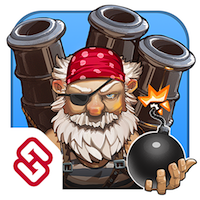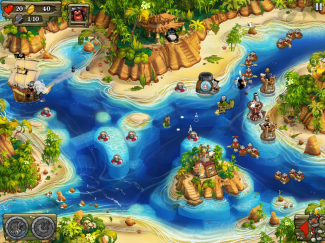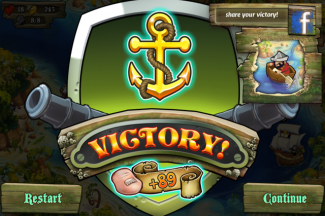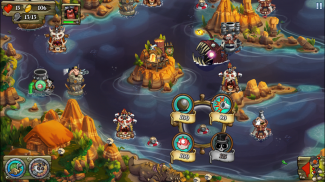Bastion
LQ: 9.15
Recommended Age: 10+
Skills Used: Planning, Working Memory, Mathematics, Reading

Grab your eyepatch and captain’s gear because it’s time to set sail on a dangerous quest to attack, defend against, and loot enemies. This is an uphill battle – you’ll be fighting against waves of the British Navy, hordes of undead souls, and even hungry, cannibalistic tribes. Pirate Legends is a nautical version of tower defense games, where strategy and organization is of utmost importance and ultimately becomes the difference between victory and defeat. As Captain, you must lead the way one battle at a time, strategically placing towers and calling upon powerful (and sometimes supernatural) assistance from heroes and magical shaman. If you want to stand a chance, you can’t forget to continually upgrade towers and defenses, as the enemies just keep getting stronger! Do whatever it takes to protect your gold and collect the enemy’s loot. The game features only cartoon violence but does require the player to read basic tower descriptions. Considering the use of this academic skill, Pirate Legends is recommended for players 8 and older.
Teachers: check out the classroom guide!
THIS GAME IS GOOD FOR KIDS WHO NEED HELP WITH:
Arranging and coordinating materials in order to complete a task.
 In the game, success hinges upon a tactical and well thought out organization of available resources and defenses. There are 20 unique towers - each with their own strengths and weaknesses. It's up to the player to consider such factors, in combination with the types of expected enemies, in order to protect his ship and it's loot. For example, a cannon tower disperses damage over an area, while a gunner tower singles out its targets. Therefore, placing cannon towers where groups of enemies are likely to aggregate (such as the "entrance" to the pathway) is more helpful in defeating hoards of enemies. However, a gunner tower is effectively used where he might expect to find a few lucky enemies that made it past the initial assault by the cannon towers. In this case, the gunner is not overwhelmed by enemies and can single out targets. When towers are organized to work together, the results are even more beneficial. For instance, chemical towers slow down enemies, so placing a chemical tower next to a weapon tower (such as a cannon) makes it even easier to take out more foes. Also, the player will want to pay attention to how spread out his towers are, so that he doesn't unintentionally leave vulnerable areas. Enemies can come from all different directions - so it's very important to ensure all areas are defended in some way. Organization skills are further useful in determining which upgrades to perform at what time. It may not make strategic sense to heavily focus upgrades on one or a few defenses. Faulty organization, or a complete failure to consider the reasons behind tower placement and upgrades, lowers the player's chances of successfully defending against enemies and only results in loss of resources and defeat.
In the game, success hinges upon a tactical and well thought out organization of available resources and defenses. There are 20 unique towers - each with their own strengths and weaknesses. It's up to the player to consider such factors, in combination with the types of expected enemies, in order to protect his ship and it's loot. For example, a cannon tower disperses damage over an area, while a gunner tower singles out its targets. Therefore, placing cannon towers where groups of enemies are likely to aggregate (such as the "entrance" to the pathway) is more helpful in defeating hoards of enemies. However, a gunner tower is effectively used where he might expect to find a few lucky enemies that made it past the initial assault by the cannon towers. In this case, the gunner is not overwhelmed by enemies and can single out targets. When towers are organized to work together, the results are even more beneficial. For instance, chemical towers slow down enemies, so placing a chemical tower next to a weapon tower (such as a cannon) makes it even easier to take out more foes. Also, the player will want to pay attention to how spread out his towers are, so that he doesn't unintentionally leave vulnerable areas. Enemies can come from all different directions - so it's very important to ensure all areas are defended in some way. Organization skills are further useful in determining which upgrades to perform at what time. It may not make strategic sense to heavily focus upgrades on one or a few defenses. Faulty organization, or a complete failure to consider the reasons behind tower placement and upgrades, lowers the player's chances of successfully defending against enemies and only results in loss of resources and defeat.
Developing a systematic approach for setting and achieving goals.
The organization involved in placing towers is closely tied to the use of Planning skills in Pirate Legends. Of course, with unlimited coins and powers, he could easily cover the entire territory with weapons and defenses, eliminating any chance of the enemy reaching his ship. Unfortunately, his resources are not endless and he must work hard to earn them. Additionally, there are only so many spaces in which to place towers. This all means that he must prioritize which towers to use, how many, and if the battle truly calls for the use of a Relic power or ally. Using only what he needs to be victorious is also important. Overloading the map with towers and allies could waste coins and supernatural assistance depending on number and types of enemies that attack. When he avoids such an "overkill" of resources, he can save his money for harder battles and enemies. Planning skills are further helpful in using supernatural powers most advantageously. When using the Kraken, for example, it's smart to place it where tougher enemies or a large group of enemies are. It would be a waste of the power to use it on only one or two enemies or weak ones. Such skills can also be used in developing additional strategies, like placing a blockade that forces enemies to cluster together - making them an easy target for an area attack.
Use this PlayTogether guide to learn how you can help your child to turn Pirate Legends play time into a positive learning and relationship-building experience. To learn more about why playing games with your children is so important, check out our Science of Play page.
Take a minute to talk to your child about how the Organization and Planning thinking skills work, and why they are important for success in school and at home.
 Set Gameplay Goals
Set Gameplay GoalsPirate Legends is a single-player game. To play with your child, we recommend taking turns between battles. However, you may work together to develop a strategy and organize and/or upgrade the towers before beginning a battle. After reading over the thinking skills pages, work together with your child to complete the objectives listed below.
Gameplay Goals:
Our Make it Work activities are designed to transform your child’s gameplay into real-world improvements in thinking and academic skills. If you’re just getting started with LearningWorks for Kids, we suggest you try them all to find which are the best for you and your child.
Read over the pages for the Organization and Planning thinking skills. Then take some time to introduce these thinking skills to your child.
Explain That:
Get organized before you begin. Have your child take out everything he will need before beginning a homework assignment. Many children begin assignments without thinking about which materials will be needed to complete the particular task. Getting out materials in the middle of a task can be distracting and takes away Focus from the assignment. Have your child write a list of everything he will need to complete for each assignment. This could range from a novel, worksheets, a pencil, or calculator depending on the specific requirements. Ensure that your child is puts these materials away (in appropriate places of course) after they are no longer needed or the assignment is completed.
 Teaching planning as an antidote to being disinterested. Do not accept being bored as an excuse. The most compelling piece of psychological research in the past few years describes how grit and persistence are far more important than intelligence and ability for future success. Teach your child these skills. One of the most important things that your child can learn from you is how to make the best of the situation at hand. That means in a situation that may be boring for him, such as going on a long car trip, that he should plan out things that he can do to keep his mind active and busy. Not only will he be happier, he might actually enjoy the trip. Encouraging your child to think about what might keep his mind busy and active in a situation that he anticipates will be boring will be very beneficial for him.
Teaching planning as an antidote to being disinterested. Do not accept being bored as an excuse. The most compelling piece of psychological research in the past few years describes how grit and persistence are far more important than intelligence and ability for future success. Teach your child these skills. One of the most important things that your child can learn from you is how to make the best of the situation at hand. That means in a situation that may be boring for him, such as going on a long car trip, that he should plan out things that he can do to keep his mind active and busy. Not only will he be happier, he might actually enjoy the trip. Encouraging your child to think about what might keep his mind busy and active in a situation that he anticipates will be boring will be very beneficial for him.
All membership plans come with full access to our entire suite of tools learning guides, and resources. Here are a few of the ones we think you’ll like the most: